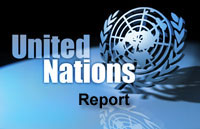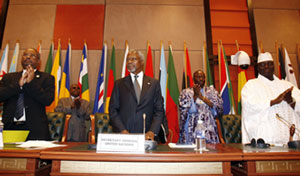Staff Writer
- Sudan and Justice: Seeking the Truth (FCN Webcast, 05-07-2006)
- Drumbeat against Iran sounds awfully familiar (FCN Webcast, 05-02-2006)

UNITED NATIONS (FinalCall.com) – On the last day of Ghana’s presidency of the Security Council, Resolution 1706 was passed authorizing a United Nations peacekeeping force of some 17,000 troops to be sent into the Darfur region of the Sudan; and accepted the report from the International Atomic Energy Agency without comment.
The resolution passed with 12 nations voting in favor, while three abstained (China, Russia and Qatar). Secretary-General Kofi Annan has urged Khartoum to accept the UN peacekeepers that would replace the African Union’s troops, arguing that peace in southern Sudan would otherwise be placed in jeopardy.
“Peace in the Sudan is indivisible,” Mr. Annan said. On the day of the vote, Mr. Annan’s office released a letter from him to Sudanese President Omar al-Bashir calling for continuing discussions with Khartoum on this issue.
“The mission’s main focus would be to protecting civilians, especially the vast population of internally displaced persons living in camps across Darfur’s three states,” commented Ambassador Nana Effah-Apenteng of Ghana, speaking in his national capacity, not as the council president for the month of August.
“Today’s vote also reaffirmed one of the principles of the African Union, which recognized the Union’s right to intervene in the affairs of a member state if it failed to protect its own citizens,” Amb. Effah-Apenteng stressed. He called on the Sudanese government to heed the voices of the international community.

The very next day, Khartoum declared the resolution illegal and announced that Sudan would not tolerate international intervention. In a story published by the Chinese People’s Daily Online, the Sudanese embassy in Nairobi said the ruling National Congress Party regarded the resolution “as un-justifiable hostility against Sudan.”
“Sudan has been an effective member of the United Nations and has never and will never put itself in a position of confrontation with the institution of which it is a member,” the statement added.
Ambassador Wang Guangya of China explained to reporters why his nation abstained. He said, while his government concurred that UN troops should take over from the African Union forces as soon as possible, the timing of the vote and the fact that the resolution did not specify “with the consent of” the Sudanese government meant they had to abstain.
Qatar’s ambassador, Jamal Nasser al-Badar, said the council should have given due regard to the numerous aspects and underlying solid principles of international practice before taking up the resolution that would have a bearing on the sovereignty of the Sudan.
“The resolution’s co-sponsors have a political point of view requiring its speedy adoption and, in light of that, Qatar is unable to support the text given its repercussions and the modalities of its implementation in the prevailing political atmosphere,” Amb. Al-Badar stated.
Amb. Vitaly Churkin of the Russian Federation said that it was important for the resolution to clearly state an imperative need for the Sudanese government’s agreement to expansion of the UN peacekeeping mission in Darfur.
The Washington, D.C.-based Africa Action organization welcomed the resolution. But there was also a caution that the resolution would be “rendered useless without a diplomatic action plan that ensures Sudanese consent for a UN intervention.”
In a press release, Marie Clarke Brill, acting co-director of Africa Action, said, “This resolution has laid the groundwork for sustained international involvement in Darfur. However, the caveat of necessitating Sudanese consent for the deployment of UN peacekeepers empowers a genocidal regime to hold hostage the international community.”
Ms. Brill said that activists would continue to hold the U.S. accountable to its responsibility to protect Sudanese civilians.
In the meantime, comments heard in the corridor outside of the Security Council seemed to lean towards a mindset that believes that the resolution would become a mute issue after the November U.S. elections. The Bush administration is pandering to the Black vote, observers said, a point not lost on Sudanese Ambassador to the UN Omar Bashir Mohammed Manis.
“Whenever there are elections on your horizon, we pay the bill,” he shouted at the western press, when they asked for a comment on the resolution.
On the matter of the IAEA report on Iran’s nuclear program Amb. Effah-Apenteng pleaded the fifth, saying that the report had just arrived and had to be reviewed by the council before there would be any comment.
In a copy of the report leaked to the UN press corps, the IAEA still says that it cannot conclude that Iran has plans to develop a nuclear weapon. But, that hasn’t stopped the think tanks for calling for sanctions.
Referring to the Aug. 31 deadline posed by resolution 1696, James Phillips, Research Fellow in Middle East Studies of the Heritage Foundation, stated, “Once the deadline passes, the United States should take immediate action to mobilize support for the strongest possible sanctions at the Security Council and press its allies to follow through with even stronger sanctions outside the UN framework, where Russia and China will not be able to protect Iran from the consequences of its nuclear defiance.”
Observers say that position ties into a story in the Los Angeles Times quoting U.S. Amb. John Bolton as stating that the U.S. does not need Security Council authority to impose sanctions.












